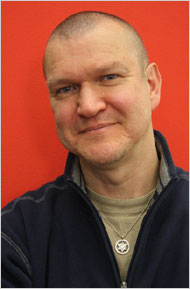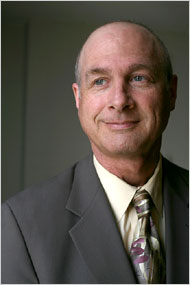Every week, Times editor Dana Jennings writes about his experiences coping with an aggressive form of prostate cancer.
By Dana Jennings
Long before I started writing publicly about my prostate cancer, I wrote about it for myself.
 Dana Jennings. (Lonnie Schlein/The New York Times)
Dana Jennings. (Lonnie Schlein/The New York Times) Since the mid-’90s, I’ve kept a journal, mainly to take my mental temperature, and as a hedge against forgetting. I’m one of those people who needs to explain himself to himself. I never truly know what I’m thinking until I’m hunched over a notebook, razor-point pen poised above a blank page.
I wrote my first journal entry about prostate cancer last March, when I learned I had a 50-50 chance of having the disease.
March 19: It makes no sense to freak out right now. And, to be honest, it makes no sense to freak out if I do have cancer.
Since then, my journal has been a record of my highs, lows and everything in between on the cancer road. I never imagined at the time that these very private thoughts would be made public. At first, I was still trying to figure out how to have cancer. I was stunned but trying to be a good stoic, as I’d been taught as a kid back home in New Hampshire.
April 9: I found out two days ago that I have prostate cancer. I’m not angry. I’m not sad. I’m not depressed — it is what it is. … I wouldn’t choose to have cancer, but it does represent the opportunity to engage in an unexpected and serious spiritual adventure.
Prostate Cancer Journal
Dana Jennings blogs about his experience with prostate cancer.
Keeping a written record of having cancer isn’t rare, and studies suggest that such writing can help patients cope better with their illnesses and even improve the quality of their lives. For me, keeping a prostate cancer journal lets me slow down, take a deep breath and potentially shrug off the hurry-up-and-wait hysteria that arrives with the disease.
Even when faced with life-changing situations, we tend toward forgetting. My journal lets me recall all the phases and stages of my prostate cancer. Sometimes, I don’t write full entries but just a couple words — kind of like Post-It notes to myself. Even so, they’re enough to remind me of the deep April dusk when my wife, Deb, told me that I had cancer (she had picked up the call from my urologist and I wasn’t home yet), or the post-op pleasure of shuffling around the neighborhood in my bathrobe — when you have cancer, you really don’t care what anyone else thinks.
And while I have worked hard to keep a good attitude, my journal has been a safe place to confess my deepest fears and sadness.
May 1: I am angry and raw, tired and hungry — feeling a bit feral, a bit mangy.
May 5: For a month now, I’ve been at loose ends, trying to be worthy of my situation, trying to be an example to my sons.
May 16: Ah, God, the Depression arrived this morning the way the heavy rain arrived — I couldn’t resist it. … I’m not persuaded at all that a complete recovery is assured. … The fact of my cancer is inescapable. As inescapable as your shadow on a sunny day.
An essential part of my journaling experience is handled by my wife — whom we lovingly call the Mistress of Minutiae. She has put together a comprehensive medical binder that details every blood test, every scan, every conversation with a doctor. Sometimes I flip through it, fascinated by the arcane details of my disease — like how it took 25 staples to close me up after my surgeon removed my prostate. It has also proved to be an invaluable resource as my wife and I have negotiated the health care system.
While there are many practical reasons to keep a prostate cancer journal, for me it’s also an act of defiance.
I grew up in a rural family whose members prided themselves on nursing bitter secrets — hoarded them like silver dollars — including their cancers: my maternal great-grandmother, my mother’s parents and a couple uncles and aunts were all killed by cancer. And most of them, until they were betrayed by seeping blood and withering flesh, said nothing about being sick.
In many ways, their silence and shame helped kill them. I keep my journal to defy that epidemic of silence. A journal lets each one of us sing a private song that shatters the silence that too often surrounds this cancer or any cancer.
May 22: The stress of cancer can be overwhelming. There’s the disease itself — burrowing and devouring, even as you outwardly look healthy as you rot from the inside. There’s the uncertainty of the health care bureaucracy — finding the right pair of hands, finding the payment. And there’s simply uncertainty.
Most days, I try not to think too much about having cancer — I rejoice in those times when I am just myself and not a “cancer patient” — but I am grateful for these in-the-moment dispatches and wonder what truths the coming year will unveil. Ultimately, I hope that these entries won’t just tell a tale of disease, but one, too, of healing.
July 1: Am I afraid? I don’t think so. I love this sweet ol’ world, and I want more of it. I’m not ready to leave, and it doesn’t feel as if it’s time to go. But, I suppose, that it’s possible. … This is what it still comes down to for me: a quiet corner, a piece of paper and a pen.












 Healthy living doesn't happen at the doctor's office. The road to better health is paved with the small decisions we make every day. It's about the choices we make when we buy groceries, drive our cars and hang out with our kids. Join columnist Tara Parker-Pope as she sifts through medical research and expert opinions for practical advice to help readers take control of their health and live well every day. You can reach Ms. Parker-Pope at
Healthy living doesn't happen at the doctor's office. The road to better health is paved with the small decisions we make every day. It's about the choices we make when we buy groceries, drive our cars and hang out with our kids. Join columnist Tara Parker-Pope as she sifts through medical research and expert opinions for practical advice to help readers take control of their health and live well every day. You can reach Ms. Parker-Pope at 

